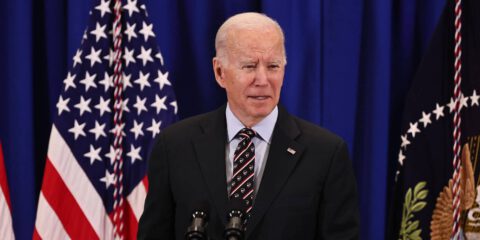במערבולת ההתייחסויות והמחלוקות סביב דברי הנשיא טראמפ, ומניעת ביקורן בארץ של חברות הקונגרס טלאיב ועומאר, נעלמה מן העין סוגיה מרכזית אחת: הצורך לשמור על הריבונות.
ההחלטה שלא לאפשר את ביקורן המתוכנן בישראל של חברות הקונגרס הרדיקליות רשידה טלאיב ואילהאן עומאר, והתבטאויותיו בעניין זה של הנשיא דונלד טראמפ, חוללו סערה רבתי בישראל ובארה”ב (ובייחוד בקרב יהדות אמריקה). דא עקא שבעיצומה של המחלוקת נעלמה מן העין סוגיית מפתח: החשיבות האסטרטגית של ההגנה על זכותה הריבונית של ישראל לקבל החלטות בסוגיות החשובות לעתידה.
אין ספק שישראל צריכה להטות אוזן קשבת לעמדותיו של נשיא ארצות הברית ולהביאן בחשבון. בה בעת, הכרחי לשמר הן את הדימוי והן את המהות של ריבונותה. יש להגן על זכותה של ישראל לקבוע מה נכון עבורה, ומה יענה על צרכיה מול הסכנות האורבות לפתחה, בשורה של סוגיות רגישות ביותר – ובכללן היחסים העדינים אך החיוניים בין ישראל ליהדות ארה”ב.
נכון גם שאין בעולם הפוסט-מודרני עצמאות מוחלטת ללא סייג; ובראייה היסטורית, פעולות התערבות של מדינה אחת בענייני הפנים של אחרת הן תופעה של קבע ביחסים הבינלאומיים (למרות שיש לכאורה נורמה רשמית האוסרת זאת). אף על פי כן, האינטרסים הלאומיים של ישראל וארה”ב כאחת מחייבים אותן לעמוד בפיתוי ולהימנע מלהיגרר לפולמוס הפוליטי המקוטב זו אצל זו.
הוויכוח המר על מהלכיהן של שתי חברות הקונגרס ועל ביטול ביקורן בישראל הפך לסוג של תאטרון פוליטי. במסגרתו, הנשיא טראמפ וכמה מעמיתיו הרפובליקנים מנסים להפוך את השנאה לישראל, שאותה הפגינו שתיהן, למנוף להכתמת כל הדמוקרטים באשר הם; ואילו הדמוקרטים נקלעו למתן מעמד ערכי ייחודי למה שמכונה “החוליה” (the squad) של ארבע חברות קונגרס רדיקליות – טלאיב ממישיגן, עומאר ממינסוטה, אלכסנדריה אוקאסיו קורטס מניו יורק ואיאנה פרסלי ממסצ’וסטס – מעמד שאינן ראויות לו, אם לשפוט על פי השימוש שעשו טלאיב ועומאר בתכנים אנטישמיים מובהקים בתעמולתן נגד ישראל. לכודה בין אלה לאלה היא מערכת היחסים הטעונה והמורכבת בין ישראל ליהדות ארה”ב.
יש לשוב ולהדגיש: מנקודת מבט אסטרטגית, המרכיב המשמעותי ביותר של המשבר גלום בכך שהסתעפויותיו הטילו צל על מעמדה הריבוני של ישראל ועל דימויה ככוח עצמאי.
האמירה מחייבת הבהרה. מטבע הדברים, מן הראוי שמדינה בעלת ברית – קל וחומר, בעלת ברית הנזקקת לסיוע ופועלת בשכונה קשה ואלימה – תכבד את בקשותיו של מי שנבחר למעמד הרם של נשיא ארצות הברית. יש לכך, בפועל, תקדימים שבהם בחרה ישראל לכופף את עמדותיה הרשמיות ואף המוסריות כדי להיענות לבקשה חריגה של הממשל, כמו בפרשת איראן-קונטראס בעת כהונתו השנייה של הנשיא רונלד רייגן.
יתרה מזאת, כאמור לעיל, הנורמה הכללית והפורמלית של אי-התערבות בענייני הפנים של מדינות אחרות (שלכאורה התקבעה כעיקרון מקודש בשלום וסטפאליה, 1648) הופרה בפועל שוב ושוב, בכל עת ובכל מקום. בחייהן האמיתיים של אומות, הפועלות בזיקת גומלין מורכבת, בחישה בענייניו של הזולת היא תופעה חוזרת ונשנית. כך בא הנשיא קלינטון ב-1996, סקסופון בידו – הוא אף הופיע בפני תלמידי תיכון – בניסיון, שנכשל, לדרבן את אזרחי ישראל לתת רוב בבחירות (האישיות) לשמעון פרס. מנגד, ראש הממשלה נתניהו פעל בניגוד לעצת הנשיא אובמה כאשר בא במרס 2015 לדבר בפני הקונגרס בסוגיה האיראנית – מהלך שגם אותו יש מי שמפרש כאקט של התערבות פוליטית.
לאמיתו של דבר, כפי שמנהיגים בישראל יודעים היטב, מוסד הנשיאות בארה”ב חשוב, אך על פי חוקת ארצות הברית הרשות המחוקקת חשובה לא פחות. לעיתים קרובות היה זה הקונגרס שלעזרתו פנתה ישראל בעת צרה. קולות מחאה בדבר “אינטרוונציה” הם אפוא בלתי-רלוונטיים. בה בעת, אינטרוונציות מתבצעות בדרך כלל בסמוי מן העין, בשל סימן השאלה על הלגיטימיות שלהן; למרבה הצער, לא זה מה שקרה הפעם.
היו מן הסתם סיבות טובות למנוע את כניסתן של שתי חברות הקונגרס. ביקורן המתוכנן, בתיאום עם גורמי הרשות הפלסטינית, היה עלול לחולל תקריות סבוכות ואפילו אלימות, בדגש על ירושלים והר הבית. אלא שהאיסור התפרש, בעיני רבים, כראיה לכך שנתניהו הפך להיות משרתו הנרצע של הבית הלבן בעידן טראמפ. מטבע הדברים אין זה עולה בקנה אחד, כלל ועיקר, עם האינטרס הלאומי הישראלי להצטייר באור זה.
ממשלת ישראל צריכה להיות הפוסק האחרון לגבי האינטרסים החיוניים של המדינה, ולא נשיא ארה”ב – אחת היא עד כמה הוא ידידותי להפליא ומועיל במהלכיו. זה נכון לגבי איראן; זה חל על הקביעה הסופית של גבולות ישראל; וזה בוודאי נכון לגבי יחסי ישראל-התפוצות. יחסים אלה הם בעלי חשיבות קריטית לישראל, והם מרכזיים בעיצוב חוסנו של העם היהודי בראייה ארוכת טווח.
בחברה אמריקנית שהתרגלה לקבל כאות של כבוד, ולא של קלון, את “המקף המחבר” שבעבר נהגו להוקיעו – כמו במושגים אירי-אמריקני, אפריקני-אמריקני, או יווני-אמריקני – יש כיום לגיטימיות לכך שיהודים יגלו אהדה, דאגה ומחויבות לארצם ההיסטורית, “המולדת הישנה שהתחדשה”. לפיכך, הדיון לגבי “נאמנות” (loyalty) – כפי שטראמפ דורש – אינו במקומו, אף שהוא מעורר צללים אסוציאטיביים קודרים. חשוב לזכור נקודה זו כאשר בוחנים את האתגר שהציב הנשיא.
השאלה העיקרית איננה נוגעת אפוא רק לאחדות העם היהודי, אלא גם לחשיבותן של החלטות ריבוניות בנסיבות הייחודיות שבהן ישראל נמצאת. היא חייבת להישאר אומה עצמאית מבחינה מדינית, המחליטה על העדפותיה כראות עיניה. זה יהיה רע לישראל, ומזיק גם לארה”ב, אם תיתפס כגרורה אמריקנית. בסופו של דבר, וושינגטון אינה מעוניינת שייווצר מצב שבו כל שחקן אזורי או בינלאומי המעוניין ליצור לעצמו מנוף לחץ על מדיניות ישראל ייזום מהלכי כוח מול ארה”ב כדי להביא את עניינו לפתחו של הממשל האמריקני, במקום לדון במישרין מול ממשלת ישראל.
זאת ועוד: הן התדמית והן המציאות של החלטות ריבוניות ניצבות בלב יכולת ההרתעה של ישראל. כוחה אומנם נשען על סיוע אמריקני, אך היא איננה “מדינת חסות” או “קליינט” במובן המקובל בתאוריה של היחסים הבין-לאומיים. עמידתה העיקשת על עצמאותה הלאומית מסמנת את ישראל כמעצמה אזורית שיכולותיה משמעותיות הרבה יותר מן הצפוי על פי גודל אוכלוסייתה, קל וחומר שטחה (בהקשר זה, תגובתו הנרגשת של מנחם בגין לדרישה האמריקנית “לבטל” – to rescind – את חוק הגולן עדיין מהדהדת).
בין היתר, עצמאות זו היא המאפשרת לישראל להמשיך ב”מערכה שבין המלחמות” (למרות סימני אי-שביעות הרצון בחוגים מסוימים בארה”ב), היינו במערכה החשאית למחצה נגד איראן וגרורותיה. בזירה הדיפלומטית, יכולתה של ישראל לנקוט עמדה עצמאית נוחה גם לארה”ב. יש גם נושאים, כולל סחר חופשי וההתחממות הגלובלית, שבהם עמדות ישראל שונות במובהק מאלו של הממשל הנוכחי.
בניסוח מקוצר ומוכר, על ישראל להיות “עם חופשי בארצנו”, כלשון ההמנון. זו אינה רק משאלת לב וחלום. זהו ציווי אסטרטגי ונכס ביום פקודה.
כמו בענייני מדינה חשובים בכל מקום, גם ריחוק העמדות הוא עניין של מידה, לא של ערכים מוחלטים. כך, כאשר ממשל אובמה ניסה במתכוון להפגין (לצד הערבי) שיש “סדק” (Daylight) בין עמדותיו לאלו של ישראל בשאלה הפלסטינית, התוצאה הייתה הפוכה לחלוטין ממה שציפה. למרבה הצער, הופרכה ההנחה שזה יקל על פריצת הדרך לשלום: מה שקרה בפועל הוא שהפלסטינים התפתו להציג עמדות תובעניות מעבר לגבולות הסביר ולנסות להרחיב את הטריז בין ארה”ב לישראל.
כל זה אין פירושו שעל המטוטלת לנוע עתה כל הדרך עד לקיצוניות השנייה (זיהוי יתר עם עמדות השותף). יש פיתוי עז לנצל את יחסי ישראל-ארה”ב למטרות פוליטיות מפלגתיות, אך סלעי היסוד של האינטרס האסטרטגי בשתי המדינות מחייבים אותן לנהוג בכבוד מופגן זו כלפי עמדתה הריבונית של זו.
סדרת הפרסומים “ניירות עמדה” מטעם המכון מתפרסמת הודות לנדיבותה של משפחת גרג רוסהנדלר.
תמונה: Bigstock









 - בניית אתרים
- בניית אתרים